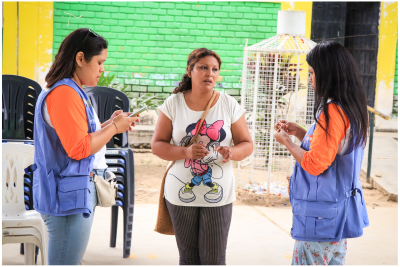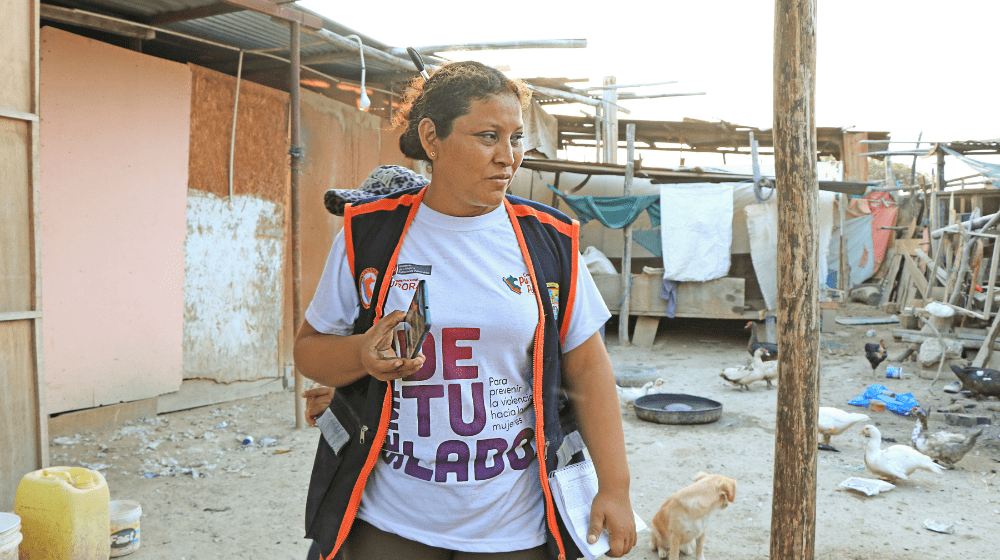Tumbes, Piura, and Lambayeque regions have suffered a devastating impact due to the intense rains and floods caused by Cyclone Yaku and the Coastal El Niño Phenomenon. These events have affected the lives of people, particularly women and adolescents, their livelihoods, infrastructure, and public services. According to reports from the United Nations Office for the Coordination of Humanitarian Affairs (UN OCHA), it is estimated that 682,467 people urgently need humanitarian assistance as of May. Among them, 96,322 displaced persons and 586,145 affected individuals have been reported. Additionally, 36,298 houses have been destroyed or rendered uninhabitable.
The impact of the climate crisis in the northern regions of Peru has revealed the importance of ensuring measures to prevent gender-based violence (GBV) and guarantee survivors' access to comprehensive, quality, and timely services that promote their recovery, including sexual and reproductive health (SRH), and initiate the process of restoring their rights.
A female leader faces violence and adversity
Amidst the devastation caused by the floods, Maria Mercedes heads to the La Molina II human settlement in the district of Veintiséis de Octubre aboard a public transport bus each morning. Several children eagerly run towards her from one of the established shelters, closely followed by their mothers, many of whom have had to confront violence during the climate crisis.
Maria Mercedes Albán is not only a social leader in her community but also the administrator of a shelter and tirelessly works to transform the lives of women who have sought refuge there, seeking safety from the prevailing violence in their localities after being left unprotected or homeless due to the destruction caused by the violent floods (huaicos) and torrential rains recorded between January and April of this year.
According to the Public Ministry, as of April of this year, there have been nearly three thousand reports of violence against women in Piura. It should be noted that, according to statistics from the Ministry of Women, 70 percent of cases of violence against women go unreported to the authorities.
Despite the lack of resources to assist survivors, María Mercedes has welcomed several of them into her home, providing support until they regain their independence. However, she has also experienced the other side of this reality. Despite offering trust and companionship to the victims, she doesn't always succeed in freeing them from the harassment and hostility of their aggressors.
"As a leader, I have gone to the police station, filed complaints, and witnessed them changing their mindset once again. This happens because no one is providing them with the support and security that they are not alone," she says.
For María Mercedes, being unable to help as much as she would like is a frustration she carries with her. However, she is determined never to stop supporting any woman who seeks her help in eradicating violence from their life.
|
She acknowledges that it is painful to witness the devastation of violence, as she knows it is not just about the physical blows but also about the trust placed in someone who failed to appreciate it. "I am pleased to see that organizations like the United Nations Population Fund are fully committed to the realities we face as women every day. Through organized workshops and psychological and legal assistance, they provide invaluable support on our journey," highlights María Mercedes. María Mercedes's story is an example of leadership and sisterhood, in which a woman dedicates her life and puts forth her best efforts to change lives and fight for the well-being and rights of all women. |

|
CERF Funds to Save Lives and Leave No One Behind
UNFPA in Peru has obtained funding from the United Nations Central Emergency Response Fund (CERF) to ensure SRH and protection services for women, adolescents, and girls affected by the floods in the northern part of the country.
This project will deploy five mobile teams comprised of legal, psychology, and social work professionals to manage cases of GBV. Three safe spaces will be established as entry points for violence prevention and community sensitization. Additionally, 5,000 dignity kits will be distributed to women and adolescents to empower them and address their menstrual hygiene needs. Regarding institutional support, 50 key stakeholders in the intervention areas will receive training on minimum standards for GBV response in emergencies.
Furthermore, primary care services, pregnancy monitoring, and access to family planning will be strengthened by providing sexual and reproductive health kits in healthcare facilities.


